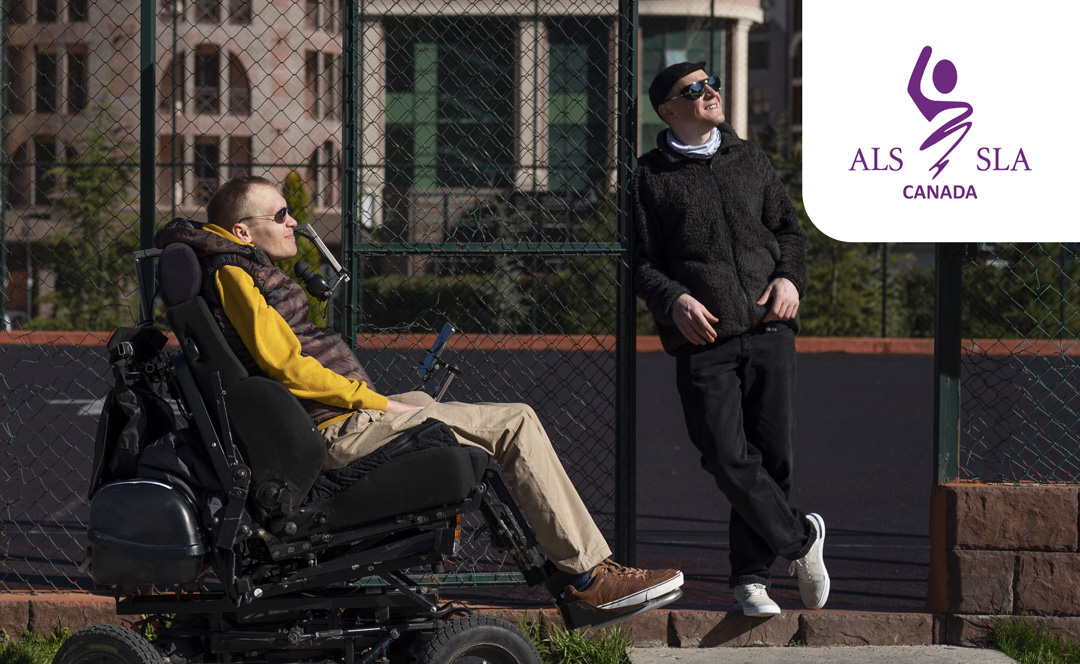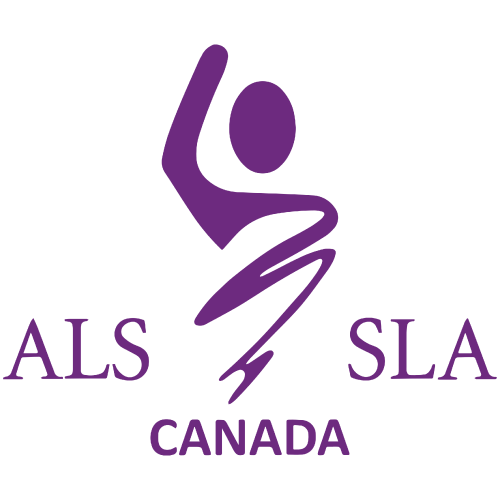ALS Society of Canada

ALS Society of Canada
Amyotrophic Lateral Sclerosis (ALS), also known as Lou Gehrig’s disease, gradually paralyzes people. In people with ALS, the motor neurons that transmit signals between the brain and the muscles of the body begin to break down. As the motor neurons die, the brain loses the ability to communicate with the muscles of the body. People diagnosed with ALS face what is called “progressive paralysis”. Over time, someone living with ALS will lose the ability to walk, talk, eat, swallow, and eventually breathe. Currently, most people diagnosed with ALS will die within two to five years.
I went home and cried for days.
Click to see video transcript
Kristine L:
I was told by a neurologist that he was pretty sure I had ALS. I think I went home and cried for days.
George A:
It’s a very debilitating disease and for her to come home and say that she had ALS, it was pretty devastating.
Tammy Moore:
When somebody is given the diagnosis of ALS, they’re given two to five years to live currently. For them, it will be progressive paralysis that they will be facing. So within their community, what they’re going to be finding is needing assistance with the journey as they navigate it.
Kristine L:
I can’t do any of the day-to-day things. I can still use a spoon, but that’s leaving. My husband, he does everything for me. He does all the laundry, the cleaning, the shopping, the cooking.
George A:
We both had to retire early from our jobs. You don’t see as many people as you once did, because you don’t get I and out as much as you used to do.
Kristine L:
Caretakers don’t get enough support. They suffer from this as much as we do.
Tammy Moore:
ALS Canada is directly responsible for people living with ALS here in Ontario, as well as for advocacy, and then for the national research program, so that there will be a future without ALS.
Kristine L:
I sort of looked up ALS Canada online, and then shortly thereafter I got a phone call from Sarah, and the gist of the conversation was that I wouldn’t go through this alone.
Having Sarah come to me was the best thing ever.
George A:
She’s always there to make things enjoyable in a sort of non-enjoyable world.
Tammy Moore:
We can only imagine as we’re navigating this devastating illness, that you will want somebody that’s been there, that will be able to help you, to be able to understand what’s coming next, to be able to be in your home and to be able to see what your next supports might be that you will require.
George A:
The disease that needs support, it needs it for the funding of the day-to-day aspect of dealing with the people who are suffering.
Tammy Moore:
Being part of Federated Health Charities is very important to ALS Canada. We are 100% donor-funded, and those dollars really help us to be able to assist people within the community.
Kristine L:
We would have had to buy all the equipment or maintenance and now that I’m on disability and George had to retire, we would be in big debt. I just think it’s the greatest organisation to help us across Canada.
While we still don’t know exactly what causes ALS, there is hope that researchers are on the brink of finding treatments to significantly alter the course of the disease. However, more funding and better access to clinical trials are needed to help develop effective ALS treatments sooner rather than later. Research is the pathway that will change the course of ALS and make it a treatable, not terminal, disease.
For people diagnosed with ALS, the disease is a physical, emotional, and financial challenge for everyone. In Ontario, ALS Canada provides essential support to people with ALS through their Equipment Program and the Community Leads team. Community Leads help people with ALS navigate the healthcare system and provide support from someone who has been there and can help them understand what’s coming next.
Federated Health Charities has supported ALS Canada in their mission to create a future without ALS since 2017.
“Being part of Federated Health Charities is very important to ALS Canada,” says Tammy Moore, CEO, of ALS Canada. “We are 100% donor-funded, and those dollars really help us to be able to assist people within the community.”
You can learn more about the work of ALS Canada at ALS Canada.
Donate to Federated Health Charities today to support a healthier Ontario and help end ALS forever.
Click on the button below to make a donation to ALS Canada through Federated Health Charities




For general questions:
Sarah Wood
Executive Director
437-925-6227
sarah.wood2@ontario.ca
Address
315 Front St. West, 5th Floor
Toronto, ON
M7A 0B8
Follow us

For general questions:
Sarah Wood
Executive Director
437-925-6227
sarah.wood2@ontario.ca
Address
315 Front St. West, 5th Floor
Toronto, ON
M7A 0B8
Follow us
© 2024 | Federated Health Charities. All rights reserved. Privacy policy. Designed by Cristhian Arevalo Leon.

